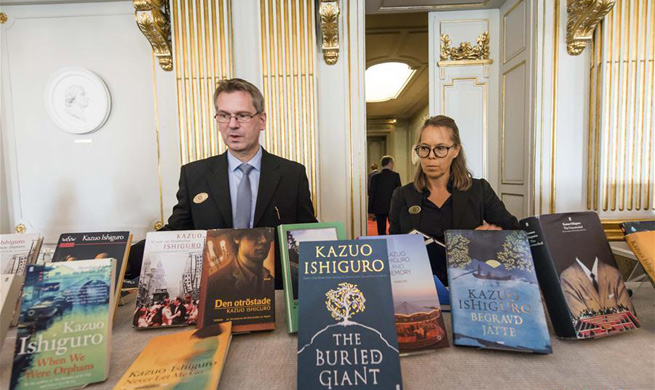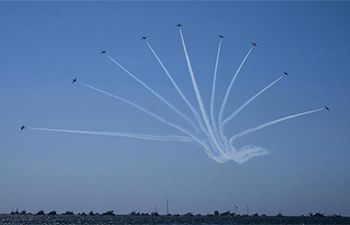by Mahmoud Fouly
CAIRO, Oct. 5 (Xinhua) -- The recent Turkish-Iranian approach following the massively-approved independence referendum of Iraqi Kurdistan region is likely to hinder the Kurdish secession dream, said Egyptian political experts.
On Wednesday, Turkish President Recep Tayyip Erdogan paid a visit to Tehran, where he met with his Iranian counterpart Hassan Rouhani and supreme leader Ayatollah Ali Khamenei. They vowed to boost bilateral cooperation and voiced rejection to the Kurdish independence vote.
A week earlier, official results of the Iraqi Kurdish referendum showed 92.73 percent of voters supporting independence and statehood, a move rejected by several Arab and regional states as well as the Cairo-based Arab League.
SECESSION DELAY
"I believe the Turkish-Iranian approach is likely to delay the secession but not stop it," said Mohamed Abbas Nagi, an expert of Iranian affairs at Al-Ahram Center for Political and Strategic Studies.
"There are no indications that the Kurds are moving forward to implement the vote result despite the big nod," he noted.
Erdogan's visit to Iran seems consistent with the recent approach between the two regional powers, as it came just days after the visit of the Turkish chief of staff to Tehran in return for his Iranian counterpart's visit to Ankara two weeks ago.
"The Iraqi chief of staff also visited Tehran and Ankara, which indicates that there is military coordination between the three countries to deal with the Kurdish issue," Nagi told Xinhua.
Nevertheless, the Egyptian expert rules out the possibility of a joint military action against Iraq's Kurdistan as long as the latter has not started to turn the referendum results into reality.
"For the time being, they just exercise economic and political pressures on the Kurds on the basis of the possibility of delaying the secession move," he explained.
As the largest stateless community in the Middle East, there are about 18 million ethnic Kurds in Turkey, 5 million in Iran, 5 million in Iraq and 2 million in Syria, which explains the concerns and the growing coordination between Iran and Turkey where the Kurds are also seeking self-determination and independence.
"We, as Iran and Turkey, only recognize the central government in Baghdad," Erdogan said during his visit to Iran.
Rouhani also referred to the Kurdish referendum as a mistake.
"We do not accept disintegration of the states in the region. In our eyes, Iraq is a unified and independent country and so is Syria," he said.
Nagi believes the ball is now at Kurdistan's court.
"The procedures that will be taken by Kurdistan will determine the next move of Iran, Turkey and Iraq," he said.
GULF, ISRAEL DISTURBED
The Kurdistan issue seems to have pushed Iran, Turkey and Iraq into the same bloc despite their historical conflicts. Iran and Turkey have a history of stiff competition in regional projects and hold different positions on the ongoing Syrian conflict, where Iran supports the current regime of Syrian President Bashar al-Assad while Turkey strongly rejects it.
Iran and Iraq had an eight-year war that ended in 1988 and left about a million dead.
However, the Iranian-Turkish current approach is believed to be disturbing for oil-rich Gulf Cooperation Council (GCC) states including Iran's rival Saudi Arabia, as well as the United Arab Emirates and Kuwait, which always accuse Iran of interfering in their domestic affairs and attempting expansion and hegemony in the Middle East.
"The Iranian-Turkish approach is not restricted to the issue of Kurdistan region but also has to do with the Syrian issue and the ongoing security arrangements in the Gulf region, in addition to their bilateral issues," said Tarek Fahmy, a political science professor at Cairo University.
The ongoing approach between the two regional powers has disturbed some other regional parties including the Gulf states, Israel as well as some states concerned about Turkey's moves in the region, Fahmy noted.
"Turkey adopts the principle of political opportunism. When Erdogan visited Saudi Arabia he failed to obtain a military base there. He then interfered in the anti-Qatar blockade by some GCC states and later turned to Iran," he said.
Iran also has direct interests not only in the issue of the Kurds but also in attracting Turkey for economic and strategic interests, the professor added.
During Erdogan's visit to Tehran, the two countries announced intention to increase their annual trade and economic transactions from 10 billion U.S. dollars to 30 billion dollars. Iran also urged Turkey to extract more natural gas from the Islamic republic's gas fields and increase investments in its energy sector.
"Iran-Turkey approach may have a serious impact on the future of the Turkish-Israeli relations in the coming period, as it may have negative repercussions on the continuation of military cooperation between Turkey and Israel in the future," said Fahmy.
The Egyptian professor believes the coalition of Iran and Turkey against Kurdistan's secession is a strong factor that could prevent the creation of a Kurdish state.
"Turkey and Iran have great weight in the region and have interests in preventing the extension of the Kurdish issue to other countries. Their coordination, together with Iraq, is at the highest level, and if a blockade is imposed on the Kurds by the three countries, the project of the Kurdish state will definitely be postponed," Fahmy noted.

















